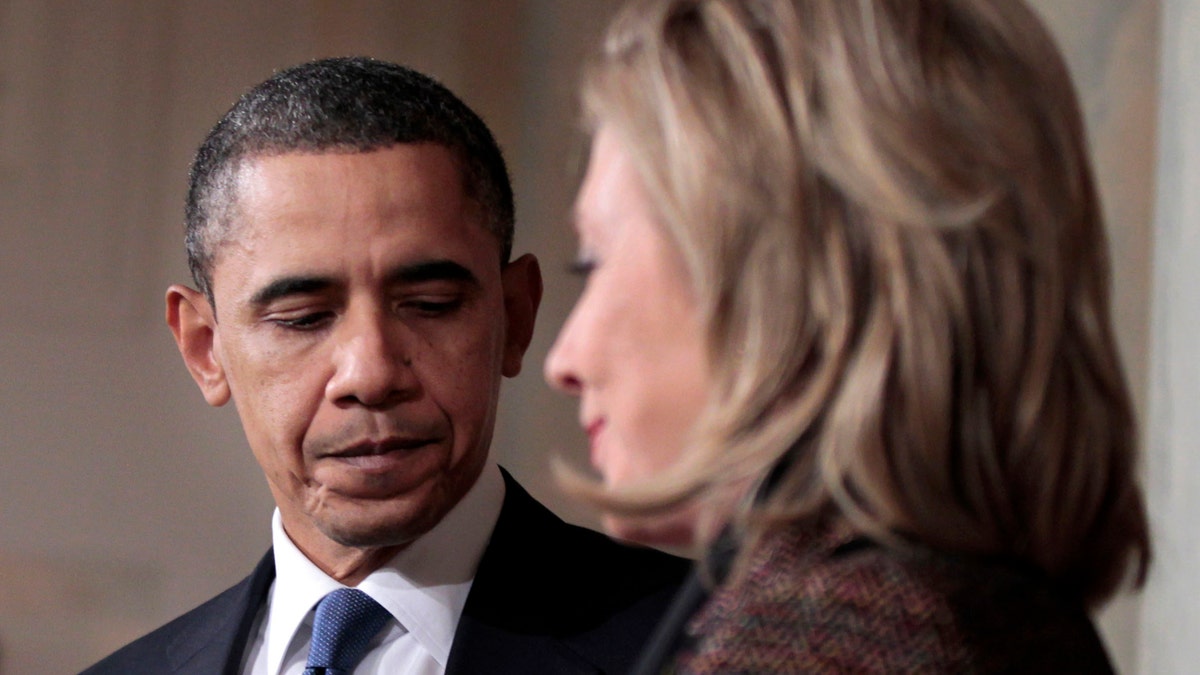
Wednesday: President Obama and Secretary of State Hillary Clinton walk away from the podium after delivering a statement on Libya in the Grand Foyer of the White House in Washington. (AP)
Did Hillary Clinton have the right to use a private server and email account for all official State Department correspondence, including those containing classified – indeed, top secret – information?
“Everything I did was permitted” the former Secretary of State told CNN in July.
“What I did was allowed,” she said Monday. “The State Department has confirmed that.”
Then on Tuesday, she told ABC news “[e]verybody in the government I communicated with, and that was a lot of people, knew I was using a personal email.” This included people at the “White House” and “across the government.”
Why has the president of the United States remained mute for months on whether or not his former secretary of state is right in claiming she had permission to use a private server and email for all official government correspondence?
The front-runner for the Democratic presidential nomination appears to be sending a clear political message as her political fortunes come under increasing attack: the White House knows I am right, as do key officials then serving in the Obama administration. -- They all had ample opportunity, directly or indirectly, to suggest my doing government business on a private email account violated administration policy or worse, might compromise any classified information.
None did.
According to the Constitution, the president is solely responsible for conducting foreign policy. The State Department is the primary governmental entity for exercising this responsibility, often relying on sensitive, indeed highly classified information provided by the nation’s intelligence and military organizations.
Presidential executive orders, along with other governmental regulations, have been issued and are constantly updated to ensure this information is properly handled and accounted for.
The scope of these orders and regulations is carefully explained to all top State Department officials and their key aides.
Yet the clamor created by former Secretary of State Clinton’s email practices seems, oddly, to be missing the most important voice of all: The president of the United States. He has remained mute for months as to whether his former secretary of state did have the right she is claiming.
Did she, or didn’t she? This a straightforward question. A basic Yes or No will suffice.
The White House seems to be claiming the president’s silence is due to the existence of an ongoing investigation into whether the emails in question contained classified information.
Admittedly, the content of a particular email may raise issues pertaining to its handling, identification, protection or redistribution. These touch on legal issues that may be under investigation.
I get that.
But Clinton’s claim, like my question, addresses a different matter entirely. It is separate and apart from her wisdom in using a private system.
The fact that someone has a right to do something doesn’t make it the right thing to do. This decision, however, is a matter of judgment. Questioning the wisdom of her choice, therefore, becomes germane only if the right itself exists.
Mrs. Clinton’s assertion also doesn’t address her actions regarding storage and handling of official correspondence in her possession after she left office. It is limited to her tenure working for President Obama.
Did the rules operative during the first term of the Obama administration give her the right she claims?
This isn’t a difficult question to answer. It doesn’t ask the president to address the qualitative content of any email currently under review or likely to be in the future. Clinton says she never sent or received an email marked as containing classified information.
This is a carefully nuanced position due in part to the laws and regulations addressing what is, and what isn’t, classified at any given point in time.
But these legitimate matters of inquiry are not germane to the simple question at hand.
American history is replete with controversies involving actions taken by top cabinet members. I am not aware of any time a president or former president failed to support a former cabinet member claiming to have been following administration policy – unless, of course, it was not true.
Mr. President, with all due respect from someone who voted for you two times, I believe you are being unfair to former Secretary Clinton, not to mention the American people.
If she did not have the right she claims, then you need to address this breach in your government’s policy publicly.
However, if she had the right – and the weight of the evidence suggests she did – then she deserves, like any worker, public support from her former boss. It is the necessary and honorable action.
You might favor Vice President Joe Biden for the Democratic nomination. He’d make a great Democratic president. But as a long-standing supporter of worker's rights, Mr. Biden would surely agree with my position.
Yes or No, Mr. President. Your view of your administration’s policy is the only one that matters, since the former secretary of state worked for you.








































